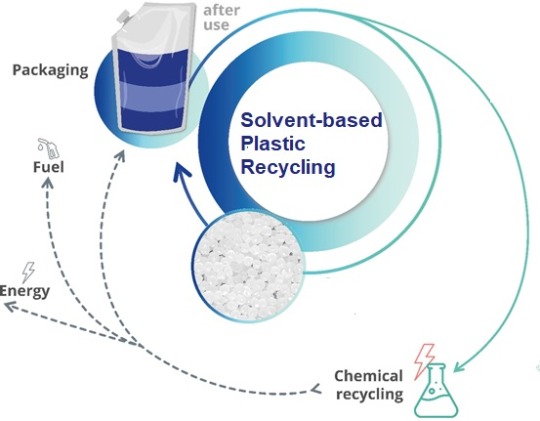#recycled plastics
Text
Plastic pollution is a menace worldwide. Plastics are now found in every environment on the planet, from the deepest seas to the atmosphere and human bodies.
Scientific evidence describing harm to the environment and humans is growing. Hence, the United Nations has resolved to negotiate a legally binding instrument to end plastic pollution.
In our work, we established the presence of chemicals in recycled plastic that can cause harm to humans or other organisms. They include pesticides, pharmaceuticals and fragrances. Others are chemicals that result from burning natural materials, man-made organic chemicals used for industrial applications like paint, and ultraviolet filters.
We quantified a total of 491 different chemical substances.
0 notes
Text
Solvent-based Plastic Recycling Market Assessment and Projections
The global solvent-based plastic recycling market size is expected to reach USD 965.10 million by 2030. Growing consumption of plastics has resulted in growing plastic waste which because of improper plastic waste management has become a global crisis. Solvent-based recycling of plastic waste is one of the innovative ways to solve this crisis. To remove impurities a selective solvent dissolution process is used to recover plastics of minimum standards suitable for reuse.

Gain deeper insights on the market and receive your free copy with TOC now @: Solvent-based Plastic Recycling Market Report
Solvent-based processes can be useful in recycling plastics that are currently non-recyclable. Multilayer plastic materials are being used in many applications like electrical and electronic industries, and food and medical packaging. Globally about 100 million tons of multilayer plastics containing as many as twelve layers of varying polymers are produced each year. As recycling multilayer plastics is difficult almost all of that plastic ends up in landfills or incinerators. Solvent-based recycling can help solve this crisis by recycling multilayer plastics.
Some of the major companies in the solved-based recycling industry include Proctor & Gamble, APK AG, and Fraunhofer. Companies are resorting to collaborations and establishing new recycling plants to capture the market. For example, In August 2021, PureCycle Technologies signed an agreement with SK Global Chemical to set up a polypropylene (PP) recycling plant in South Korea. Also, major universities are actively researching to find novel methods of solvent recycling.
For example, scientists at the University of Wisconsin–Madison (UW-Madison) have discovered a method called Solvent-Targeted Recovery and Precipitation (STRAP) processing for extracting the plastics in multilayer plastics using solvents. In this process, polymers in a commercial multilayer plastic such as polyethylene, polyethylene terephthalate (PET), and ethylene vinyl alcohol by using a sequence of solvent washes.
#Plastic Recycling#Circular Economy#Sustainable Plastics#Plastic Waste#Recycling Solutions#Green Technology#Plastic Management#Waste Reduction#EcoFriendly#Recycled Plastics#Plastic Innovation#Waste Management#Plastic Pollution#Circular Plastics#Waste To Value#Plastic Recovery#Plastic Reuse#Plastic Reprocessing#Plastic Revolution
1 note
·
View note
Text
Recycled Plastics Market is Anticipated to Reach US$30.2 Bn by the End of 2026
Growing consumer preference for recycled plastic products, fast-developing plastic waste management infrastructure, and stronger public-private commitments to curb plastic pollution have positioned the global recycled plastics market on a steep growth trajectory. Today, consumers, manufacturers, and policy makers are rapidly advancing towards more sustainable practices in waste management. Seeing the hazardous environmental effects of untreated industrial waste, illegal dumping of plastics in landfills, uncontrolled disposal of plastics in oceans, and rampant use of virgin plastic in virtually every product, corporates and governments across the world have accelerated their drive to robust plastic recycling initiatives.
Over the coming decade, global revenues from plastics recycling are expected to increase by about 30% annually. Driven by favorable regulations and demand for recycled plastic products, the global recycled plastics market is set to be worth US$30.2 Bn in 2026, rising from a value of US$19.5 Bn in 2019.
For More Industry Insights Read: https://www.fairfieldmarketresearch.com/report/recycled-plastics-market
Packaging, Automotive, Electronics: Key Segment in Terms of End-Use Industry
During the forecast period, the packaging industry will account for over 60% of the total market share of the global recycled plastics market. This is primarily due to the growing emphasis on sustainable packaging and the circular economy model. Within packaging, the food and beverages sector is the key growth drive. In recent years, technological developments have made recycled resins suitable for use in food applications – a factor that is fueling the demand for recycled plastics in the food and beverages sector. Consequently, leading food and beverages companies have pledged to significantly increase the usage of recycled plastics and compostable packaging in their supply chains and facilities. Other industries witnessing an increased demand for recycled plastics include the automotive industry and the electrical & electronics industry. These industries are poised to observe a surge in demand for auto parts, electric and electronic equipment, ICT products, and auto components made from recycled plastics. Moreover, robust green initiatives and investments in R&D are projected to aid partnerships across the business landscape of the global recycled plastics market.
Despite the sound growth opportunities in the recycled plastics market, concerns around cost and strict competition with first-use plastics in terms of performance are expected to be major obstacles hampering growth across the market. Moreover, improper waste management infrastructure, coupled with the ban on the import of certain waste plastic material in some economies, can further restrict rapid market growth in the near future.
North America to Emerge as the Regional Market Leader Across the Recycled Plastics Market
The fastest-growing region in the global recycled plastic market is North America due to robust plastic recycling programs, relentless green innovation, and presence of global corporations in this region. By 2026, Asia Pacific will hold more than half of the demand for recycled plastics due to the consistent demand for recycled plastics in the packaging, construction, and textile industries of China, India, and Southeast Asia. Further, innovation and greater consumer awareness are expected to substantially improve the plastic recycling rates in the EU by 2030. Prominent market players include Custom Polymers, Clear Path Recycling, Plastipak Holdings, Veolia, KW Plastics, Suez, B. Schoenberg & Co., Green Line Polymers, B&B Plastics, and Jayplas.
Looking For a Sample Copy of This Report? Request the Same Here: https://www.fairfieldmarketresearch.com/report/recycled-plastics-market/request-sample
About Us
Fairfield Market Research is a UK-based market research provider. Fairfield offers a wide spectrum of services, ranging from customized reports to consulting solutions. With a strong European footprint, Fairfield operates globally and helps businesses navigate through business cycles, with quick responses and multi-pronged approaches. The company values an eye for insightful take on global matters, ably backed by a team of exceptionally experienced researchers. With a strong repository of syndicated market research reports that are continuously published & updated to ensure the ever-changing needs of customers are met with absolute promptness.
#recycled plastics market#recycled plastics#recycled plastics market share#recycled plastics market size#recycled plastics market trends#recycled plastics market growth#fairfield market research#plastic recycling industry#plastic recycling market#plastic recycling
0 notes
Text
Recycled Plastics Market worth $43.5 billion by 2026
The report "Recycled Plastics Market by Type (PET, PE, PP, PVC, PS), Source (Bottles, Films, Fibers, Foams), End-Use Industry (Packaging, Textile, Building & Construction, Automotive, Electrical & Electronics) and Region - Global Forecast to 2026", size is expected to grow from USD 27.9 billion in 2021 to USD 43.5 billion by 2026, at a CAGR of 9.3% during the forecast period. The market is witnessing growth due to the growing awareness regarding the environmental benefits provided by recycled plastics over virgin plastics. Moreover, the energy consumed in recycling plastics is less than that of virgin plastics, which is further driving the demand for recycled plastics in many applications.
Bottles is expected to be the largest and fastest-growing source in the recycled plastics market during the forecast period.
Bottles are the largest and the fastest-growing source of recycled plastics. Post-consumer PET bottles are the most commonly used plastics for plastic recycling on account of their huge availability and technical feasibility to produce PET granules. Moreover, PET bottles have a better collection and sorting network. The majority of bottles are made of PET resin, which is the most commonly recycled resin and has the highest recycling rate in the recycled plastics market. Therefore, waste bottles are expected to remain the biggest source for producing recycled plastics as many countries are foraying into the recycling business and will depend on bottles as their material source.
Download PDF: https://www.marketsandmarkets.com/pdfdownloadNew.asp?id=115486722
Polyethylene Terephthalate: The largest type in the recycled plastics market
Polyethylene Terephthalate (PET) was estimated to be the largest segment of the recycled plastics market, by type in 2029. PET plastics are 100% recyclable, easy to recycle, and have a lower cost, which makes them an attractive plastic material to recycle. PET is the largest recycled resin worldwide and will continue to be the most demanded recycled resin. PET can be recovered and recycled repeatedly and remolded to produce new PET products. It can also be chemically broken into its constituent raw materials, which can then be purified and converted into new PET resins. It can be used in many products such as new containers, carpets, textiles, protective packaging, industrial strapping, automotive parts, and construction materials. PET has the highest recycling rate globally and is only limited by the amount of used PET material collected.
APAC is expected to hold the largest market share in the global recycled plastics market during the forecast period.
APAC is the largest and market of recycled plastics, with China being the major emerging market. One of the major developments in the recycled plastics market was the ban on waste imports by China. This affected the dynamics of the recycled plastics market, whereby many developed countries were left to find new dumping pits for their growing piles of waste. Developed countries in North America and Europe had to deal with the ever-increasing volume of unprocessed wastes. Although the choice of destinations for exporting these wastes has been other emerging countries such as India, Pakistan, or Southeast Asia, the logistics cost is much higher than that for China. Therefore, the logical solution was to improve their own patchy recycling systems, prompting them to reuse more recycled materials themselves.
Sample Request: https://www.marketsandmarkets.com/requestsampleNew.asp?id=115486722
Indorama Ventures Public Ltd. (Thailand), Veolia (France), Suez (France), Jayplas (UK), Alpek (Mexico), Biffa (UK), Republic Services (US), Stericycle (US), Far Eastern New Century Corporation (Taiwan), KW Plastics (US), among others are the leading recycled plastics manufacturers, globally.
1 note
·
View note
Text
Plastic producers have known for more than 30 years that recycling is not an economically or technically feasible plastic waste management solution. That has not stopped them from promoting it, according to a new report.
“The companies lied,” said Richard Wiles, president of fossil-fuel accountability advocacy group the Center for Climate Integrity (CCI), which published the report. “It’s time to hold them accountable for the damage they’ve caused.”
Plastic, which is made from oil and gas, is notoriously difficult to recycle. Doing so requires meticulous sorting, since most of the thousands of chemically distinct varieties of plastic cannot be recycled together. That renders an already pricey process even more expensive. Another challenge: the material degrades each time it is reused, meaning it can generally only be reused once or twice.
The industry has known for decades about these existential challenges, but obscured that information in its marketing campaigns, the report shows.
The research draws on previous investigations as well as newly revealed internal documents illustrating the extent of this decades-long campaign.
Industry insiders over the past several decades have variously referred to plastic recycling as “uneconomical”, said it “cannot be considered a permanent solid waste solution”, and said it “cannot go on indefinitely”, the revelations show.
The authors say the evidence demonstrates that oil and petrochemical companies, as well as their trade associations, may have broken laws designed to protect the public from misleading marketing and pollution.
1K notes
·
View notes
Link
It took 90 days for the fungi to degrade 27 per cent of the plastic tested, and about 140 days to completely break it down, after the samples were exposed to ultraviolet rays or heat.
Chemical engineering professor Ali Abbas, who supervised the research team, said the findings were significant.
"It's the highest degradation rate reported in the literature that we know in the world," the professor said.
From ABC News Australia
#plastic#plastic pollution#plastic recycling#trash#environment#hope#good news#technology#science#ecoanxiety#environmental grief#environmental anxiety#ecogrief
3K notes
·
View notes
Text
Basf and Sulzer Chemtech joined forces to advance technologies for renewable fuels
Basf and Sulzer Chemtech joined forces to advance technologies for renewable fuels
Headquarter of Basf in Ludwigshafen
Basf and Sulzer Chemtech (GTC Technology) have signed a Memorandum of Understanding (MoU) with the goal of advancing technologies for renewable fuels and chemically recycled plastics that will further expand the partners’ portfolio of sustainable solutions. The companies agreed to enter a strategic partnership to reduce the carbon intensity of renewable diesel…

View On WordPress
0 notes
Link
The global Recycled Plastics market was valued at USD 46.05 Billion in 2020 and is expected to reach USD 75.57 Billion by year 2028, at a CAGR of 6.3%. Recycled plastics are resins that are manufactured by reusing waste plastic products. They are produced by recovering plastic scraps and wastes and then reprocessing them into useful products. It can be defined as the process of cleaning, sorting and processing pre-consumer or post-consumer plastic wastes into resins for various applications.
0 notes
Text
(since no one is reading my tags or other reblogs): this post has an addition. the addition is specifically about co-mingle recycling in most usamerican cities. always check your local guidelines for recycling. the point of this post was not to tell you what you can or can’t recycle, anyway. the point was that a lot of recycling gets thrown out because it’s fucking contaminated. if you can’t clean your recyclables to keep them from contaminating a whole bin, just put it in the trash. you don’t need to feel guilty about it... that's it. that's why i wrote the post.
#this is not a character judgement against him btw i'm just surprised#working at a landfill and recycling plant no matter how short a time will seriously turn you into the kind of person#who un-contaminates recycling bins#i'm in there digging plastic straws and bags and food-soiled containers out of the recycling#because otherwise the entire bin will be trashed
7K notes
·
View notes
Text
According to MarketsandMarkets™, the global Recycled Plastics Market size is expected to grow from USD 27.9 billion in 2021 to USD 43.5 billion by 2026, at a CAGR of 9.3% during the forecast period. Favorable initiatives to promote the use of recycled plastics in developed countries, growing acceptance of recycled plastics consumption in the textile industry as fibers in developing countries of Asia Pacific, and cost-effective, sophisticated recycling technologies are some of the major factors driving the global recycled plastics market.
APAC is expected to be the largest market for recycled plastics, with China being the key market in the region. China accounts for a major share of the regional demand for recycled plastics, followed by Japan, India, and South Korea. These countries are expected to witness a steady increase in consumption between 2021 and 2026. According to the World Bank, Asia Pacific is the fastest-growing region in terms of both population and economic growth. The region has experienced significant growth in the last decade and accounted for over a third of the world’s GDP. The high economic growth, coupled with the mounting population, is expected to boost the industrial sector in the region, which will increase the need for plastics from industries. Continuous and easy availability of recycled plastics, low-cost labor, lower price, and environmental benefits are also some of the major factors driving the recycled plastics market in the region
Indorama Ventures Public Ltd. (Thailand), Veolia (France), Suez (France), Jayplas (UK), Alpek (Mexico), Biffa (UK), Republic Services (US), Stericycle (US), Far Eastern New Century Corporation (Taiwan), KW Plastics (US), among others are the leading recycled plastics manufacturers, globally.
#Recycled Plastics Market#Global Recycled Plastics Market#Recycled Plastics#Covid 19 Impact on Recycled Plastics Market
0 notes
Text
I wish companies would admit that reusable packaging is good. I will pay extra to buy something that comes in a decorative glass jar I can reuse as opposed to a plastic bottle. I’m more likely to buy tea that comes in a cute metal tin that I can put sewing supplies in later.
761 notes
·
View notes
Text
A team of scientists from Nanyang Technological University, Singapore (NTU Singapore) has developed an artificial worm gut to break down plastics, offering hope for a nature-inspired method to tackle the global plastic pollution problem.
By feeding worms with plastics and cultivating microbes found in their guts, researchers from NTU's School of Civil and Environmental Engineering (CEE) and Singapore Center for Environmental Life Sciences Engineering (SCELSE) have demonstrated a new method to accelerate plastic biodegradation.
Continue Reading.
292 notes
·
View notes
Text
PLEASE SIGN! IT TAKES 20 SECONDS!
#solarpunk#ecopunk#punk#punk diy#queer punk#hopepunk#diy punk#anarchism#ecofriendly#climate emergency#environmentalism#earth#environment#protest#gogreen#reduce reuse recycle#recycling#global plastics treaty#global warming#global news#climate news#world news
120 notes
·
View notes
Text







Zen Houses, Liberec, Czechia - Petr Stolín Architekt
#Petr Stolín Architekt#architecture#design#building#modern architecture#interiors#house#minimal#plastic#recycled materials#transparent#light#steel#low cost#eco home#tiny home#garden#cool houses#czechia#studio
277 notes
·
View notes
Text

A Nonprofit Is Creating Modern Loungers Entirely from Plastic Pulled from Bali’s Waterways
137 notes
·
View notes
Text
The student-led startup from Nigeria recycles plastic sachets into paint, and adds an organic insect repellent to fight malaria.
#nigeria#africa#plastic pollution#maleria#insecticides#pesticides#insect repellent#good news#environmentalism#science#environment#nature#plastic recycling#recycling#upcycle#upcycling
89 notes
·
View notes